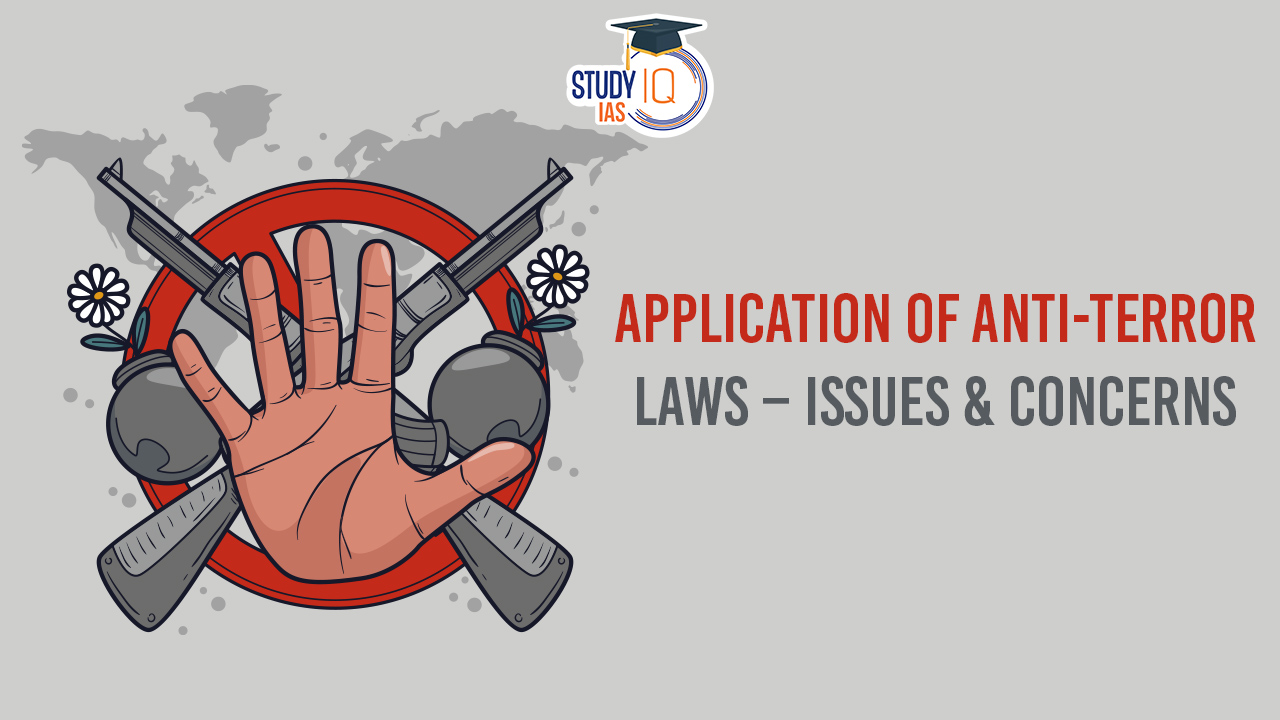Table of Contents
Context: The Jammu and Kashmir High Court’s judgement on journalist Fahad Shah’s case raises critical questions about the application of India’s UAPA in matters concerning personal freedom and legal rights.
Evolution of Anti-Terror Laws In India
- The Unlawful Activities (Prevention) Act (UAPA) of 1967 and the National Security Act of 1980 currently serve as India’s primary legal frameworks for countering terrorism.
- The UAPA, initially established in 1967, underwent significant amendments in 2004, adding a new chapter specifically for tackling terrorist activities.
- Before the 2004 amendment of the UAPA, the Terrorist and Disruptive Activities (Prevention) Act (TADA) of 1987 and the Prevention of Terrorism Act (POTA) of 2002 were the main legislations targeting terrorism in India.
We’re now on WhatsApp. Click to Join
Terrorist and Disruptive Activities (Prevention) Act (TADA) of 1987
- The 1987 Terrorist & Disruptive Activities (Prevention) Act, (TADA), was enacted to specifically address terrorist activities in India and imposed more stringent measures than the UAPA.
- Upon its introduction, TADA faced legal challenges regarding its validity and was brought before India’s highest court.
- In the landmark 1994 case Kartar Singh v. the State of Punjab (3 SCC 569), the Supreme Court of India upheld its constitutionality, assuming that the significant powers granted by the Act would be exercised responsibly and for public welfare.
- Despite this, there were numerous instances of misapplication and misuse of these powers by law enforcement, leading to unintended consequences.
- This misuse ultimately led to the repeal of TADA in 1995.
Prevention Of Terrorists Act (POTA), 2002
- India faced several terrorist attacks in the early 2000s, including the 1993 Mumbai bombings and the 2001 Parliament attack, which fueled concerns about national security.
- This led to the enactment of the Prevention of Terrorism Act in 2002 (POTA, 2002).
- The Act faced legal challenges similar to those against TADA, particularly in the case of PUCL v. Union of India, but the Court upheld it for the same reasons.
- However, post-enactment, there were widespread reports of the Act’s severe misuse. Allegations surfaced that POTA was contributing to increased corruption within India’s police and judicial systems.
- Civil liberties and human rights organisations actively opposed the Act, and it became a significant issue in the 2004 elections.
- The United Progressive Alliance (UPA) government, upon election, followed through on its campaign promise to repeal POTA. In 2004, after the UPA assumed power, POTA was repealed, and its key provisions were incorporated into the UAPA.
Unlawful Activities (Prevention) Act, 1967
- Definition: The Unlawful Activities (Prevention) Act, of 1967, is an Indian law aimed at identifying, prohibiting, and legally addressing individuals, organisations, and activities involved in unlawful or terrorist actions that endanger India’s sovereignty, territorial integrity, and security.
- Key Provisions: The Unlawful Activities (Prevention) Act, 1967 (UAPA) empowers the Central Government to declare an individual or an organisation as a terrorist/terrorist organisation if they have
- Committed, participated in, prepared for, promoted, or are otherwise involved in terrorism.
- To impose all-India bans on associations that are declared “unlawful”.
- Indian nationals and foreign nationals can be charged under the Act, and
- Offenders can be held accountable in the same manner even if the crime was committed on foreign land outside India.
Powers Granted Under the UAPA Act
Under the Unlawful Activities (Prevention) Act (UAPA) in India, the government has a range of significant powers to address unlawful activities and terrorism, including:
- Banning Organizations: Authority to ban organizations involved in unlawful activities or terrorism, leading to the prohibition of their activities and asset seizure.
- Designation of Individuals as Terrorists: The power to designate individuals as terrorists if they are found to be involved in unlawful activities or supporting terrorism, subjecting them to severe penalties.
- Detention of Suspects: Provision for the detention of suspects for up to 180 days without formal charges under specific conditions, aiding terrorism-related investigations.
- Strict Bail Provisions: Imposition of strict bail provisions, making it challenging for accused individuals to obtain bail, often shifting the burden of proof to the accused.
- Surveillance and Searches: Authority to conduct extensive surveillance and searches to gather evidence related to unlawful activities and terrorism.
- Freezing of Assets: The ability to freeze assets of individuals or organizations involved in unlawful activities or terrorism, restricting their access to funds.
- Interception of Communications: Power to intercept and monitor communications, including phone calls and electronic messages, to gather evidence and intelligence related to unlawful activities and terrorism.
- Control Over Publications: Authority to control or prohibit publications, documents, and online content that promote or support unlawful activities and terrorism
Significance of UAPA Law in Contemporary India
- Countering terrorism
- Banning organisations and designating individuals as terrorists
- Preventing terrorists from circumventing the law
- Addressing lone-wolf attacks and individuals not affiliated with established organisations.
- Quicker process of justice delivery
- Empowering officers in the rank of Inspector to investigate cases
- Requiring investigations to be completed within 90 days
- Reducing delays in attaching proceeds
- Allowing the seizure of property connected with terrorism without approval from the Director General of Police when investigations are conducted by NIA officers
| Section 43D (5) of UAPA |
Meaning of “Prima facie” in the context of section 43D (5) of UAPA
K. A. Najeeb Vs Union of India, 2021
|
Amendments In UAPA Act, 1967
2004: Criminalized indirect support for a terrorist organization, including raising funds for a terrorist act or being a member of a terrorist organization.
2008: Broadened the definition of “funds” to encompass a wider range of financial activities related to the financing of terrorism offences.
2012: Expanded the definition of a “terrorist act” to include offences that pose a threat to the country’s economic security.
2019: Empowered the government to designate individuals as terrorists, not just organizations.
- Changed the approval authority for the seizure of property connected with terrorism; now, the approval of the Director General of the National Investigation Agency (NIA) is required instead of the Director General of Police.
- Empowered NIA officers of the rank of Inspector or above to investigate cases.
- Included the International Convention for the Suppression of Acts of Nuclear Terrorism (2005) in the Schedule under the Act.
Challenges
- Fundamental Rights Infringement: The UAPA Act, by allowing detention for up to 180 days without a formal charge sheet, infringes upon fundamental rights, including those enshrined in Articles 14, 19(1)(a), and 21.
- Contrary to the Presumption of Innocence: The Act contradicts the principle of “innocent until proven guilty,” a fundamental tenet of justice, by not upholding this right.
- Excessive Discretionary Authority: The lack of objective criteria for classifying individuals as terrorists gives the government significant unchecked authority, risking misuse of power.
- Ambiguity and Unclear Definitions: Vague definitions of terms like “terrorism” and a broad interpretation of ‘unlawful activity’ lead to confusion and differing interpretations, impacting the law’s effectiveness and fairness.
- Concerns in the Appeals Process: The establishment of a government-appointed three-member review committee, which may include serving bureaucrats, raises concerns about the independence and fairness of the appeals process.
- Low Conviction Rates: A low conviction rate, with less than 3% of cases registered under the UAPA Act resulting in convictions between 2016 and 2020 (as per a PUCL report), highlights significant challenges in effectively prosecuting cases under the Act.
Way Forward
- Review and Reform: Consider a comprehensive review of the UAPA Act to address concerns related to fundamental rights and discretionary authority. This could involve amending the law to establish clearer definitions, stricter oversight mechanisms, and provisions that protect individual rights.
- Presumption of Innocence: Uphold the fundamental principle of “innocent until proven guilty” by amending the UAPA Act to ensure that individuals have the opportunity to present their case before arrest and receive a fair trial within a reasonable time.
- Judicial Review: Encourage active judicial review of cases under the UAPA Act to ensure that legal proceedings adhere to the principles of justice and fairness.


 Future of India–Bangladesh Relationshi...
Future of India–Bangladesh Relationshi...
 Significance of a Strong Defence Industr...
Significance of a Strong Defence Industr...
 The Changing Patterns Of India’s Stude...
The Changing Patterns Of India’s Stude...

























